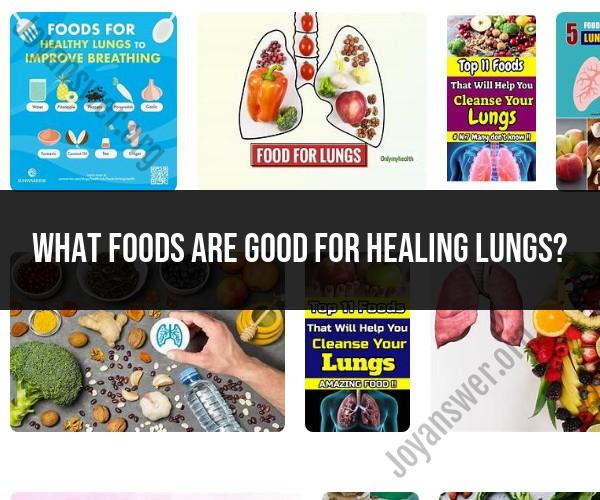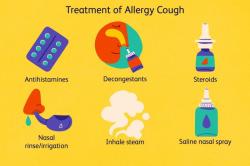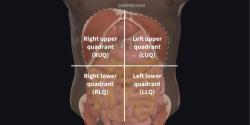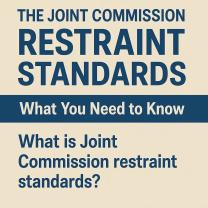What foods are good for healing lungs?
Certain foods may provide nutritional support for lung health and aid in the healing process for individuals with lung conditions or those recovering from respiratory issues. These foods can help reduce inflammation, strengthen the immune system, and promote overall lung function. Here are some foods that are beneficial for lung health:
Fruits and Vegetables: Rich in antioxidants, vitamins, and minerals, fruits and vegetables can help reduce inflammation and support lung health. Focus on colorful options like berries, citrus fruits, leafy greens, carrots, and bell peppers.
Turmeric: Curcumin, a compound found in turmeric, has anti-inflammatory and antioxidant properties that may help reduce inflammation in the lungs.
Ginger: Ginger is known for its anti-inflammatory properties and may help relieve respiratory symptoms. It can be consumed in various forms, including as a tea or in recipes.
Garlic: Garlic contains compounds that have anti-inflammatory and antibacterial properties, which may be beneficial for lung health.
Onions: Onions contain quercetin, an antioxidant that may help reduce inflammation and support lung function.
Berries: Blueberries, strawberries, and other berries are rich in antioxidants, which can help combat oxidative stress and inflammation.
Apples: Apples contain antioxidants and flavonoids that may support lung health.
Cruciferous Vegetables: Broccoli, cauliflower, cabbage, and Brussels sprouts are high in glucosinolates, which may have cancer-fighting properties and support lung health.
Fatty Fish: Salmon, mackerel, and sardines are excellent sources of omega-3 fatty acids, which have anti-inflammatory properties and may benefit lung health.
Nuts and Seeds: Almonds, walnuts, chia seeds, and flaxseeds provide healthy fats and antioxidants that can help reduce inflammation.
Green Tea: Green tea contains antioxidants called catechins, which may support lung health and reduce inflammation.
Herbal Teas: Herbal teas like chamomile and peppermint can help soothe respiratory symptoms and provide hydration.
Honey: Honey may help relieve cough and soothe the throat. It can be added to herbal teas or consumed in moderation.
Lean Proteins: Include lean protein sources like poultry, lean meats, tofu, and legumes in your diet to support overall health.
Whole Grains: Choose whole grains like brown rice, quinoa, and whole wheat bread over refined grains for added fiber and nutrients.
Water: Staying well-hydrated is essential for maintaining healthy lung function. Drink plenty of water throughout the day.
Avoid Irritants: Limit or avoid foods and beverages that can irritate the lungs, such as spicy foods, hot drinks, and excessive caffeine or alcohol.
It's important to note that while a healthy diet can support lung health, it is not a substitute for medical treatment. If you have specific lung concerns or conditions, consult with a healthcare professional or a registered dietitian for personalized dietary recommendations and guidance tailored to your needs. Additionally, these dietary recommendations are generally beneficial for overall health and can be part of a balanced and nutritious diet.
Healing Lungs with Food: Nutrient-Rich Options
Food can play a vital role in healing the lungs. By eating a nutrient-rich diet, you can help to reduce inflammation, boost your immune system, and promote lung repair.
Here are some of the best nutrient-rich foods for lung healing:
- Fruits and vegetables. Fruits and vegetables are packed with vitamins, minerals, and antioxidants that are essential for lung health. Choose a variety of colorful fruits and vegetables to ensure that you are getting a wide range of nutrients.
- Whole grains. Whole grains are a good source of fiber, which can help to reduce inflammation and improve digestion. They are also a good source of vitamins, minerals, and antioxidants.
- Lean protein. Lean protein sources, such as chicken, fish, and beans, are low in saturated fat and calories. They are also a good source of nutrients that are essential for lung healing, such as selenium and zinc.
- Healthy fats. Healthy fats, such as those found in olive oil, avocados, and nuts, can help to reduce inflammation and improve lung function.
- Herbs and spices. Herbs and spices, such as turmeric, ginger, and garlic, contain compounds that have anti-inflammatory and antioxidant properties.
Nourishing Your Respiratory Health: Foods for Lung Healing
Here are some specific foods that are known to be beneficial for lung health:
- Cruciferous vegetables. Cruciferous vegetables, such as broccoli, cauliflower, and Brussels sprouts, contain compounds that can help to prevent and fight lung cancer. They may also help to improve lung function.
- Allium vegetables. Allium vegetables, such as garlic, onions, and leeks, contain compounds that have anti-inflammatory and antioxidant properties. They may also help to boost the immune system.
- Berries. Berries are packed with antioxidants, which can help to protect the lungs from damage.
- Fatty fish. Fatty fish, such as salmon, tuna, and mackerel, are a good source of omega-3 fatty acids. Omega-3 fatty acids have anti-inflammatory properties and may help to improve lung function.
- Green tea. Green tea contains compounds that have anti-inflammatory and antioxidant properties. It may also help to boost the immune system.
Culinary Remedies: Using Food to Support Lung Health
There are many ways to incorporate nutrient-rich foods into your diet. Here are a few ideas:
- Start your day with a healthy breakfast. A healthy breakfast can help to fuel your body and mind for the day ahead. Try eating a bowl of oatmeal with berries and nuts, or a yogurt parfait with fruit and granola.
- Snack on healthy foods throughout the day. Snacking on healthy foods can help to keep your energy levels up and prevent you from overeating at mealtimes. Choose snacks that are high in nutrients and low in processed ingredients, such as fruits and vegetables, nuts, and seeds.
- Make healthy meals at home. Cooking at home is a great way to control the ingredients in your food and ensure that you are getting a nutrient-rich meal. Try cooking with fresh, seasonal ingredients and avoiding processed foods.
- Add herbs and spices to your food. Herbs and spices are a great way to add flavor to your food and boost your nutrient intake. Try adding turmeric, ginger, and garlic to your cooking.
By eating a nutrient-rich diet, you can help to heal your lungs and improve your respiratory health.













